ESC3: Quality control for Integral Membrane Proteins
Dates: 12th-14th September 2022
Location: EMBL Hamburg (c/o DESY) (EMBL-SPC)
Full address: EMBL (c/o DESY), Notkestrasse 85, Build. 25a, 22607 Hamburg, Germany
Number of participants: 10
It is no longer possible to apply for this course.

Description of the course:
Integral membrane proteins (IMPs) are known to be challenging proteins to purify and characterise due to their native membrane conformation. For electron cryo-microscopy (cryo-EM), the biophysical characterisation of sample purity, homogeneity and integrity, as well as biochemical activity are a prerequisite for the preparation of good quality grids, as these factors impact the result of the computational reconstruction.
The main goal for this course is to address the sample preparation of IMPs and its complexes using a biophysical quality control pipeline prior to single particle cryo-EM grid preparation.
Outline of the course:
The course starts at lunch time on Monday the 12th of September and ends in the afternoon on Wednesday the 14th of September. A more detailed programme will be added at a later date.
The course will contain tutorial lectures, instrument demonstrations and practical sessions.
Tutorial lectures will be given by:
- Inga Hänelt
- Misha Kudryashev
- Christian Löw
Instrument demonstrations and practical sessions will cover:
- Nano- differential scanning fluorimetry (NanoDSF)
High-throughput assay for buffer and detergents screen optimisation of membrane proteins - Mass Photometry (MP) and Dynamic Light Scattering (DLS)
Oligomerisation state, aggregation behaviour and reconstitution for EM samples preparation - Electron microscopy (EM) preparation
Negative- stain EM of membrane proteins sample preparation for single particle analysis of membrane proteins
Organizer: Maria Garcia Alai
Tutors: Stephan Niebling, Osvaldo Burastero, Angelica Struve, Katharina Veith
Other details:
The course is aimed at researchers who already have some experience in membrane protein purification as part of sample preparation, who are eager to acquire new scientific and technical skills on quality control and electron microscopy.
Participation is free and participants will receive financial support (lunches and accommodation) to attend the course. Successful applicants will be informed of the eligible expenses when they receive a formal acceptance letter.
Download a pdf version of a poster for this course here.
The MOSBRI End user Short Course, Quality control for Integral Membrane Proteins, was held at EMBL, Germany in September 2022
9 participants attended the MOSBRI course (ESC3).
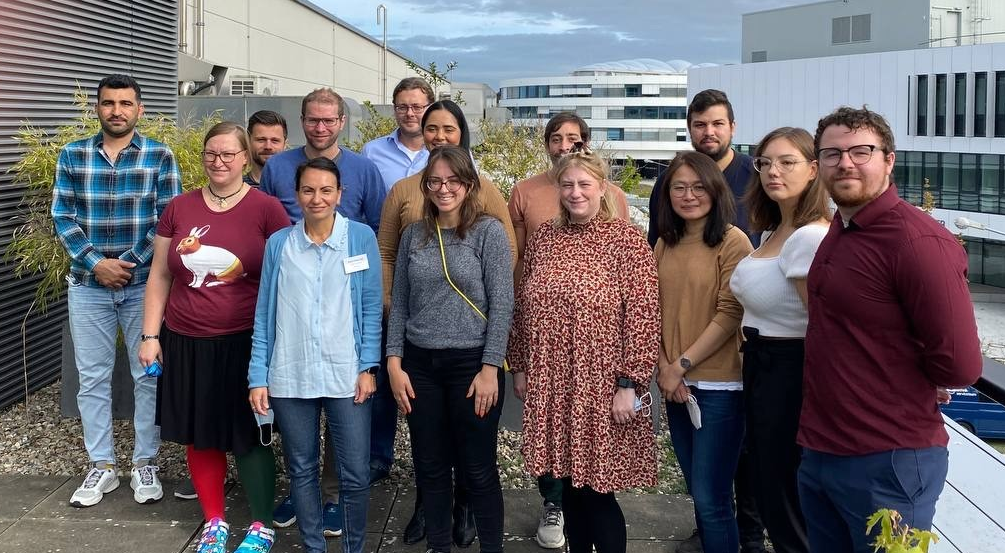
The course was hosted by Maria Garcia Alai, Stephan Niebling, Osvaldo Burastero, Angelica Struve, Katharina Veith.
Course programme
Monday 12th September 2022
| 12:30 –13:00 | Welcome and Registration Centre for Structural Systems Biology (CSSB), Building 15, Lobby |
| 13:00 –14:00 | “Integrative Structural Biology for Studying Conformational Dynamics of Membrane Transport Proteins” – Inga Hänelt Centre for Structural Systems Biology (CSSB), Building 15, Auditorium |
| 14:00 –15:00 | “Computational microscopy of membrane proteins methods and tools” – Ahmadreza Mehdipour Centre for Structural Systems Biology (CSSB), Building 15, Auditorium |
| 15:00 –15:30 | Coffee Break Centre for Structural Systems Biology (CSSB), Building 15, 1st Floor |
| 15:30 –16:00 | Tour of the EMBL Hamburg – SPC core facility/ DESY |
| 16:00 –19:00 | Free afternoon |
| 19:00 | Barbecue (DESY bistro/canteen) |
Tuesday 13th September 2022
| 9:30 –11:00 | Quality Control of Membrane Proteins – Practical session (CSSB 01.228) – nanoDSF |
| 11:00 – 11:30 | “Quality control of Membrane Proteins” – Maria Garcia Alai (48e Building, seminar room) |
| 11:30 –12:00 | nanoDSF analysis |
| 12:00 –13:30 | Lunch (Poke bowls) Centre for Structural Systems Biology (CSSB), Building 15, 1st Floor |
| 13:30 –16:00 | Quality Control of Membrane Proteins – Practical session (CSSB 01.228) – nanoDSF, Dynamic Light Scattering (DLS) and introduction to Mass Photometry (MP) |
| 16:00 –16:30 | Coffee break Centre for Structural Systems Biology (CSSB), Building 15, 1st Floor |
| 16:30 –18:00 | Quality Control of Membrane Proteins – Practical session (CSSB 01.228) – Mass Photometry (MP) |
| 18:00 | Heading to dinner |
| 18:30 –20:30 | Farewell Dinner |
Wednesday 14th September 2022
| 9:30 –10:15 | Introduction EMBO course – mPEPC2 – Christian Löw (48e Building, seminar room) |
| 10:15 –12:00 | Biophysical Data Analysis – Osvaldo Burastero (48e Building, seminar room) |
| 12:00 –13:00 | Lunch (Soup & sandwiches) Centre for Structural Systems Biology (CSSB), Building 15, 1st Floor |
| 13:00 –15:00 | Cryo EM Tour at CSSB & Farewell from Hamburg, Germany |
Course material
The following presentations were given as part of the course. Select the filename to download the file.
Lecture – Integrative structural biology for studying conformational dynamics of membrane transport proteins
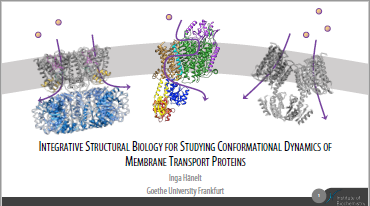
Lecture – Computational microscopy of membrane proteins: methods and tools
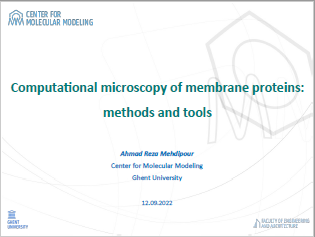
Lecture – Quality Control For Integral Membrane Proteins
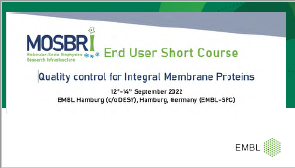
Lecture – EMBL-SPC
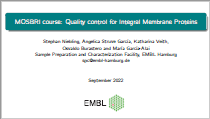
Lecture – Introduction EMBO course: mPEPC2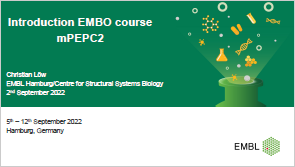
Lecture – Data and biophysics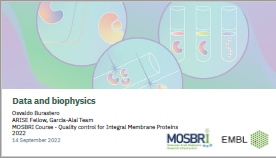
Quality control protocols
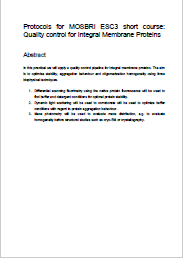
Application to take part in the course
The course is limited to 10 participants and therefore any interested parties will need to submit an application for consideration to take part.
Who is eligible to apply:
Anyone with a workplace/host institution in one of the EU member or associated states may apply to attend this course (this includes people from the UK). Applicants from industry are also welcome. It is expected that the applicant has knowledge of molecular biology, chemistry and/or biophysics and that it is applicable to their area of research/work. In order to get the most out of this course, participants should ideally have some experience in membrane protein preparation and be able to bring samples for analysis during the course. Applications from scientists in the early-stage of their career are particularly encouraged and we will strive to obtain a gender balance of the participants in the course.
How to apply:
The application consists of:
- submission of a completed course application form which includes:
- motivation for attendance
- a short scientific CV
- details of your sample requirements, this should include a summary of your project, target protein(s), and the stage of purification and characterisation you are currently at in your project.
- if you are a student or postdoc, a reference letter.
Once the application period is closed, all submissions will be reviewed and the applicants will be informed of the outcome.
When to apply:
It is no longer possible to apply for this course. The applications received are under review and applicants will be informed once a decision has been made.
Application deadline:
The deadline for submission of an application to participate in this course is: 30th June 2022 extended to 15th of August 2022.
